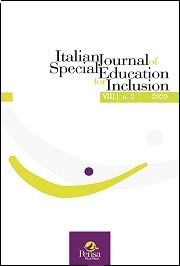Accessibilità al patrimonio culturale: un progetto di Inclusive Research nelle Disabilità Intellettive
DOI:
https://doi.org/10.7346/sipes-02-2020-20Abstract
The aim of this work is to investigate accessibility in cultural spaces for people with intellectual disabilities (ID). Inclusive Research, which promotes a type of research with people with disabilities rather than on them, has been chosen as a paradigm to explore this issue. It has been combined with the Capability Approach which values the need to consider the effective interaction between individual processes and experiences and the environment in which the person is inserted. The two paradigms guided the choice of methodologies for data collection and analysis, as well as results interpretation and discussion.
Eight participants with ID and their educators were involved in the present study. The analysis context was an archaeological site of the FVG Region. Results of the focus groups highlighted the impact of some obstacles on the accessibility to cultural information for people with ID: (i) Physical mobility (architectural and perceptual barriers); (ii) Access to information (poor readability and comprehensibility of information); (iii) Autonomy (difficulty in the autonomous interaction with physical spaces and access to cultural content and continuous need to ask for help from the caregiver).
Results are discussed highlighting the complexity of the emerged needs reported by people with intellectual disabilities, as well as the necessity to respond to this complexity in order to allow the highest development of everyone's skills, abilities and potential. The final attempt is to develop theoretical reflections that can inform possible operational practices of environmental transformation from an inclusive perspective.


